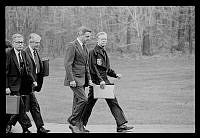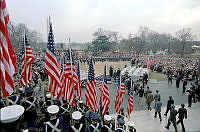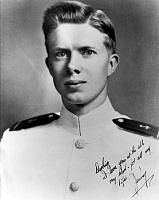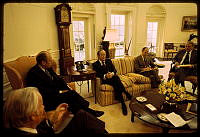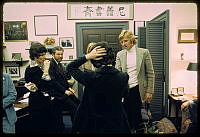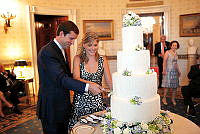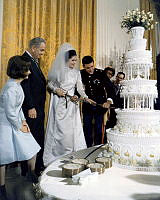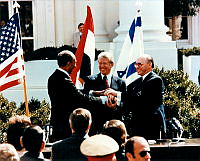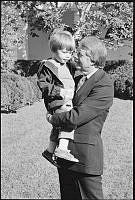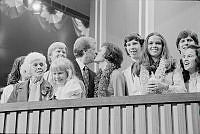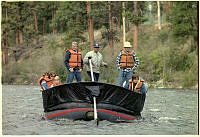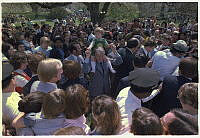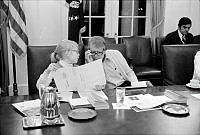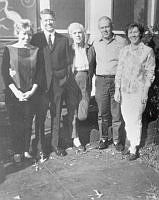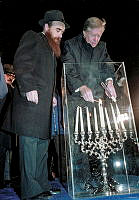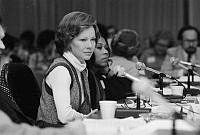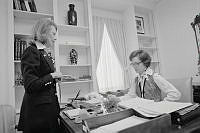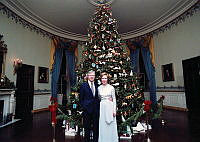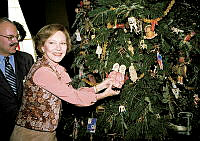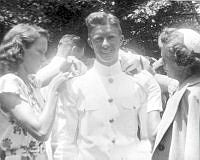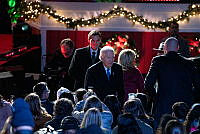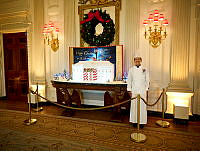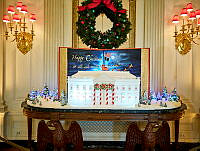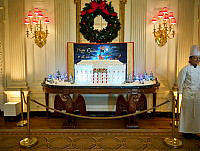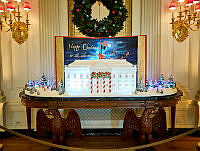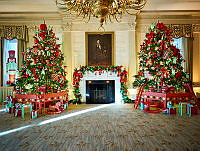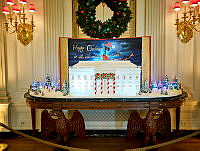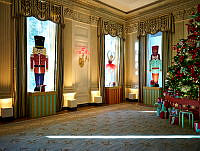Rubenstein Center Scholarship
An Author and a President
The Unlikely Friendship of Ulysses S. Grant and Mark Twain
Two of the nineteenth century’s most prominent American men, Ulysses S. Grant and Samuel Clemens, better known by his pen name Mark Twain, developed an unlikely friendship extending from the White House to Grant’s deathbed. The steely, quiet demeanor of the former Union Army general contrasted sharply with the jocular nature of the celebrated author. Nevertheless, over the years a deep relationship blossomed, cementing a friendship for the ages.
In late November 1867, a young Mark Twain arrived in Washington, D.C., to serve as private secretary to William Stewart, a senator from Nevada. Twain had just returned from a tour of Europe and the Middle East aboard the former Union steamship, Quaker City. While his travels on the Quaker City would later be documented in the successful 1869 book, The Innocents Abroad, he was fairly unknown at the time he went to Washington. Twain later wrote in his autobiography, “I was not known then; I had not begun to bud--I was an obscurity…”1
After moving into the Willard Hotel, just down the street from the White House, Twain spent a great deal of time at the Capitol observing the proceedings of the Fortieth Congress, meeting congressmen, making friends with correspondents, and writing for newspapers.2 On November 25, he wrote home, “Am pretty well known now- intend to be better known. Am hobnobbing with these old Generals and Senators and other humbugs for no good purpose.”3

This photograph of Mark Twain was taken on May 20, 1907.
Library of CongressOne of these “old Generals” happened to be Ulysses S. Grant. In a notebook chronicling Twain’s life from August through December 1867, he noted their first meeting, “Acquainted with Gen Grant-- said I was glad to see him--he said I had the advantage of him.” Although the details of this first meeting are few and far between, it is likely that Grant and Twain met through Senator Stewart.4 It is unknown where this meeting took place, but their introduction laid the groundwork for a very important friendship that benefited both men later in life.
On January 19, 1868, Twain attempted to contact Grant but was unsuccessful, writing to his family, “I called at Gen. Grant’s house last night. He was out at a dinner party, but Mrs. Grant said she would keep him at home on Sunday evening.”5 If this second meeting ever came to fruition, it is undocumented. Around the same time, Twain secured a book contract to write about his travels aboard the Quaker City and concluded his short stint as private secretary by early March.6 Twain had grown weary of Washington, writing in a letter to his brother, “I am most infernally tired of Wash. & its ‘attractions.’”7
Two years later on July 4, 1870, Mark Twain returned to Washington to lobby the passage of a Senate bill that would reorganize the Tennessee judicial system.8 By this point, Twain had gained greater notoriety with the publication of The Innocents Abroad the previous year. After Twain observed congressional proceedings for several days, Senator Stewart brought him to the White House on July 8 to meet President Grant, now a year into his first term. The author described the encounter in a letter to his wife, Olivia, later that evening, “Called on the President in a quiet way this morning. I thought it would be the neat thing to show a little embarrassment when introduced, but something occurred to make me change my deportment to calm & dignified self-possession. It was this: The General was fearfully embarrassed himself!”9

This nineteenth century oil on canvas portrait depicts President Ulysses S. Grant
White House Collection/White House Historical AssociationWhat caused the president’s fearful embarrassment? Twain recounted the events of July 8 many years later in more detail: “I shook hands and then there was a pause and silence. I couldn’t think of anything to say. So I merely looked into the General’s grim, immovable countenance a moment or two, in silence, and then I said: ‘Mr. President, I am embar[r]assed-- are you?’ He smiled a smile which would have done no discredit to a cast-iron image and I got away under the smoke of my volley.”10
Their meeting at the White House certainly left a deep impression on the president. Nearly ten years later, Twain agreed to speak at a Chicago reception given in Grant’s honor on November 13, 1879. The mayor of Chicago, Carter Harrison, introduced the two men. Upon introduction Grant paused, looked at Twain, and asked, “Mr. Clemens, I am not embarrassed, are you?” The tension broke and the two men laughed together. To Twain’s delight, Grant recalled their previous meeting and a friendship, twelve years in the making, was born.11
Starting in the fall of 1880, Twain began to call often at Grant’s home in New York City. By this point a costly world tour had depleted most of Grant’s personal savings, so Twain encouraged the president to publish his memoirs.12 Grant did not believe his memoirs would be profitable, writing in a January 1881 letter to Twain, “I have always distrusted my ability to write anything that would satisfy myself and the public would be much more difficult to please. In the second place I am not possessed of the kind of industry necessary to undertake such a work.”13
Several years later, after a failed railroad venture plunged Grant and his wife Julia into near destitution, he reconsidered. In 1884, he wrote several articles for The Century Magazine at $500 per article. This venture encouraged the former president to write his memoirs, right around the same time doctors diagnosed him with throat cancer that fall.14
Meanwhile, Mark Twain busied himself preparing The Adventures of Huckleberry Finn for publication. After he experienced a falling out with several publishers, Twain established his own publishing house, Charles L. Webster & Publishing, to produce this new book. One night in November 1884, Twain ran into Richard Watson Gilder, editor of The Century Magazine. Gilder invited Twain and his wife to dinner at his home. Gilder told Twain about Grant’s articles and let slip that the former president was prepared to write his memoirs.15

This 1885 engraving depicts the title character Huckleberry Finn from Mark Twain's The Adventures of Huckleberry Finn. Twain published the novel in 1885, through his publishing company Charles L. Webster & Publishing. Twain also published Personal Memoirs of U.S. Grant through this publishing company the same year.
Armed with this information, Twain went to Grant’s house the very next morning to ask whether he signed the contract with Century. Grant responded that the contract was drawn but not signed. Twain reviewed the contract, appalled to discover Century’s offer of ten percent royalty. Instead, Twain offered to publish Grant’s memoirs at his new publishing house.16 Grant deliberated over this proposition, initially reluctant to renege on his original agreement with Century. However, after comparing offers and discussing the matter with his son, Colonel Frederick Dent Grant, Grant wrote to his financial advisor George W. Childs on November 23, 1884: “On reexamining the Contract prepared by the Century people I see that it is all in favor of the publisher, with nothing left for the Author. I am offered very much more favorable terms by Chas L. Webster & Co. Mark Twain is the Company.”17 Twain offered Grant a choice, a twenty percent royalty or seventy percent of the total profit. Grant chose the latter and signed the contract.18
Grant began writing as the cancer ravaged his body. By the winter of 1885, his health deteriorated to the point he could no longer leave the house. Twain visited Grant in late February. Stunned by the former president’s declining health, Twain feared Grant would not live to finish his memoirs.19 But Grant persevered, brushing off several close calls with death to continue his work.
Meanwhile, Twain navigated the publishing world, communicating with Century about Grant’s magazine articles and responding to claims about the true authorship of Grant’s memoirs. On April 29, Theron C. Crawford, correspondent for the New York World, alleged that Grant’s assistant, Adam Badeau, an accomplished author in his own right, was the true writer behind the memoirs. Several years prior, Badeau, who worked as part of Grant’s Union Army staff during the Civil War, published Military History of Ulysses S. Grant.20 Twain responded publicly in early May, publishing a letter from Grant in the New York Tribune emphatically denying the charges, “This is false. The composition is entirely my own.”21 Shortly after, Badeau parted ways with Grant in an attempt to quell the rumors.

Draft pages from Personal Memoirs of U.S. Grant written by Ulysses S. Grant in 1885.
Library of CongressOn June 16, Grant relocated from his home in New York City to a cottage called Mount McGregor in the Adirondack Mountains at the advice of his doctor.22 One week later, as Grant moved into the final stages of writing, he grappled with his impending death in a letter to his physician, John H. Douglas: “I said I had been adding to my book and to my coffin. I presume every strain of the mind and body is one more nail in the coffin.”23
Twain joined Grant at Mount McGregor on June 27. Grant could barely speak, and the two men communicated by slips of paper as they went over page proofs together. During this visit, Grant completed his chapter on Appomattox and assessments of Lincoln and several Civil War generals. Twain departed for Elmira, New York, and the friends continued to correspond during the final days of June.24 Grant wrote in one letter, “There is much more that I could do if I was a well man. I do not write as clearly as I could if well.”25 On July 1, 1885, he wrote a preface which Twain immediately released to the public. With the preface written, at long last Grant finished his book. Just three weeks later, on July 23, 1885, President Ulysses S. Grant passed away surrounded by his loved ones.26
As the nation mourned the death of their beloved general and president, Twain worked to prepare Personal Memoirs of U.S. Grant for publication. The two-volume set detailing Grant’s life, Civil War experiences, and portraits of famous men, including Abraham Lincoln, was a major financial success. The first printing alone sold 300,000 sets and Twain presented Julia Grant with a check for $200,000. After additional sales, the royalties eventually totaled $450,000 (or twelve million dollars in today’s currency), affording Mrs. Grant a comfortable retirement.27

This photograph by Mathew Brady depicts First Lady Julia Dent Grant
Library of CongressIn addition to its great financial success, critics lauded Personal Memoirs as a literary classic. On February 3, 1886, Twain wrote to Julia Grant, “An able critic told me the other day that the Memoirs are so noble a literary masterpiece that they will long outlast any other monument that can be erected to the memory of General Grant.”28 Ultimately, the relationship between Grant and Twain, formed during that fateful first meeting in Washington, resulted in an enriching friendship which helped cement President Grant’s legacy. Although Grant’s writing was driven mostly by his and his family’s financial needs, he began a historic trend of presidents writing their memoirs for public consumption after leaving office.













